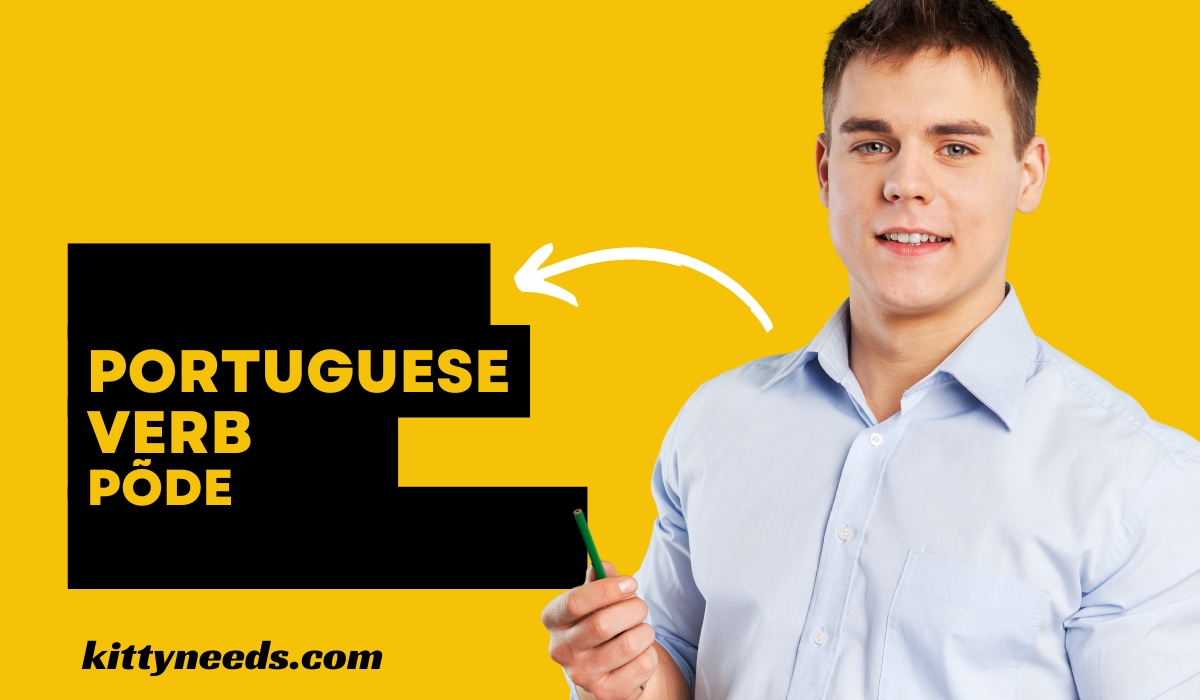Blog
Pôde: Understanding the Nuances of the Portuguese Verb “Poder”

põde
Verbs are the backbone of any language, and understanding their nuances is key to mastering a new tongue. In Portuguese, the verb “poder” is a focal point in everyday conversation, expressing possibilities, capabilities, and permissions. However, the devil is in the details, especially when it comes to different tenses and forms of this vital verb.
For Portuguese learners, language enthusiasts, or just those interested in the intricacies of language, this deep-dive into “poder” explores its past, present, and future forms, as well as common mistakes to avoid and how to use it with precision. By the end of this extensive guide, readers will wield the verb “poder” with confidence and accuracy, taking a significant step forward in their Portuguese language journey.
Pode vs Pôde: Understanding the Accent
The difference between “pode” and “pôde” is more than just a letter—it’s about time, it’s tense. In the present tense, “pode” (without an accent) is used, signifying the present ability to do something. For example, “Ela pode falar inglês” means “She can speak English,” indicating her current language proficiency.
However, when discussing past events where the verb “to be able to” is necessary, the past tense “pôde” is employed. “Ele não pôde vir à festa” translates to “He couldn’t come to the party,” expressing his inability in the past situation.
The Accents of Portuguese
Portuguese is a language that greatly values its accents. They not only dictate the word’s meaning but also help form the correct tense. In the case of the verb “poder,” the acute accent on the ‘ô’ in “pôde” or the absence of an accent in “pode” carries the deep semantic weight of past vs. present. It’s a small mark that makes a big difference and one that learners must pay close attention to.
Conjugation of “Poder”
The conjugation of “poder” covers various tenses, each indicating a different temporal context. Here, we’ll provide a comprehensive overview of how “poder” changes to match these contexts, including the present, past, future, and subjunctive tenses.
| Tense | Conjugation | Example |
|—————-|———————–|———————————-|
| Present | Eu posso | Eu posso te ajudar |
| Past Imperfect | Eu podia | Eu podia tocar guitarra |
| Future | Eu poderei | Eu poderei te encontrar lá fora |
| Conditional | Eu poderia | Eu poderia ir com você |
| Subjunctive | Que eu possa | Espero que eu possa te ver amanhã |
Present Tense
The present tense of “poder” is used to indicate current capabilities or permissions.
Examples:
- Eu posso tocar violão. (I can play the guitar.)
- Tu podes ler e escrever em Espanhol. (You can read and write in Spanish.)
- Nós podemos ir ao cinema hoje. (We can go to the movies today.)
Past Tense
Expressing past possibilities, capabilities, or permissions, the past tense is crucial for recounting events in the past.
Examples:
- Ele pôde estudar na universidade. (He was able to study at the university.)
- Ela não pôde viajar por causa da pandemia. (She couldn’t travel due to the pandemic.)
- Nós pudemos assistir ao show na semana passada. (We were able to watch the concert last week.)
Future Tense
The future tense of “poder” looks ahead to potential and upcoming events.
Examples:
- Eu poderei te ajudar amanhã. (I will be able to help you tomorrow.)
- Ele poderá visitar seus avós no próximo sábado. (He will be able to visit his grandparents next Saturday.)
- Tu poderás ver o resultado na próxima semana. (You will be able to see the result next week.)
Conditional
The conditional tense serves a hypothetical future, indicating what someone would be able to do under certain circumstances.
Examples:
- Ele poderia ter sucesso se tentasse. (He could succeed if he tried.)
- Nós poderíamos ir ao cinema se quiséssemos. (We could go to the movies if we wanted to.)
- Ela poderia ter falado a verdade. (She could have spoken the truth.)
Subjunctive
The subjunctive is used for situations that are doubtful or not guaranteed, often in dependent clauses.
Example:
- Espero que eu possa te ver amanhã. (I hope I can see you tomorrow.)
- Ele deseja que tu possas vir à festa. (He wishes for you to be able to come to the party.)
- É importante que eles possam comparecer à reunião. (It’s important that they can attend the meeting.)
Common Mistakes with “Poder”
Understanding “poder” isn’t just about what it means but also about what it doesn’t mean. Common mistakes can trip up even the most astute learners, especially regarding tense usage and contextual appropriateness.
Using “Pôde” for Incorrect Tenses
A frequent error is using “pôde” where “poderá” (future tense) or “poderia” (conditional tense) is required. This results in a mix-up of past and future events, which can muddle the message.
Correct Usage:
- Ela poderá te chamar mais tarde. (She will be able to call you later.)
- Ele poderia ter ido à loja ontem. (He could have gone to the store yesterday.)
Misconstruing Past vs Present
Another pitfall is failing to distinguish between the present and past forms of “poder,” which can lead to improper storytelling when discussing events.
Correct Usage:
- Eu posso falar francês. (I can speak French.)
- Eu não pude te encontrar ontem. (I couldn’t meet you yesterday.)
The Inherent Possibility of “Poder”
Using “poder” to express something that is not possible in any circumstance can lead to a misuse of the verb.
Correct Usage:
- Ela pode voar como um pássaro? (Can she fly like a bird?)
- Ela não pôde estar em dois lugares ao mesmo tempo. (She couldn’t be in two places at the same time.)
Using “Poder” Effectively
With a firm grasp of the various tenses and potential pitfalls, harnessing the power of “poder” comes down to context and intent. Using “poder” effectively means being aware of the different roles it can play in a sentence.
Shifting Between Possibility, Ability, and Permission
One of the remarkable aspects of the verb “poder” is its versatility in delineating between what is possible, what one is capable of doing, and what is sanctioned.
Expressing Possibility:
- Poder chover hoje à noite. (It may rain tonight.)
- O filme pode começar a qualquer momento. (The movie can start at any time.)
Indicating Ability:
- Eu posso jogar tênis. (I can play tennis.)
- Nós podemos te ajudar. (We can help you.)
Discussing Permission:
- Tu podes sair mais cedo. (You can leave early.)
- Os alunos não podem falar durante o teste. (Students can’t speak during the test.)
Formal vs Informal Context
Just like in any language, certain words take on different flavors depending on the formality of the situation. “Poder” is no exception.
In formal settings, such as business meetings or letters, it’s customary to use the full conjugation of the verb “poder,” such as “posso,” “pode,” and “podemos.” In more casual settings, contractions like “posso” and “pode” are entirely acceptable.
Formal:
- Eu posso compreender a situação. (I can understand the situation.)
- Ela pôde concluir o projeto dentro do prazo. (She was able to complete the project within the deadline.)
Informal:
- Eu posso explicar isso para você. (I can explain this to you.)
- Eles podem nos ajudar amanhã. (They can help us tomorrow.)
Modal Verbs Related to “Poder”
Understanding “poder” becomes even more profound when seen in the context of other modal verbs that convey necessity, desire, or conjecture.
Dever (Must):
- Tu deves estudar para o exame. (You must study for the exam.)
Querer (Want):
- Ele queria poder te ver ontem. (He wanted to be able to see you yesterday.)
Saber (To Know):
- Ela sabe que pode contar com você. (She knows that she can count on you.)
Conclusion
Portuguese, like any language, is a nuanced tapestry woven with grammar rules and linguistic shades. The verb “poder” not only reflects what we can physically do but also mirrors our capabilities, limits, and opportunities. For those on the path to mastery, it’s not just a matter of “pode” or “pôde”—it’s about the story and the potential each form unlocks.
To enhance your ability to command “poder” in all its forms, invest in practice, seek out language partners, and immerse yourself in Portuguese culture. With each correct usage, you solidify your understanding and fluency, bringing the vast implications of “poder” to life in your everyday speech.
Take this knowledge and apply it boldly. “Poder” isn’t just another verb—it’s a gate to express the wide expanse of your linguistic universe. Keep learning, keep growing, and remember: quando você estuda gramática, “você pode falar qualquer língua!”
FAQs
1. What is the difference between “poder” and “pôde”?
- Answer: “Poder” is the infinitive form of the verb meaning “to be able to/can,” used to indicate ability, permission, or possibility in present or future contexts. “Pôde” is the past tense (preterite) form of “poder,” used to indicate an ability, permission, or possibility that was specific to a past moment.
2. When should I use “poderia” instead of “poder”?
- Answer: “Poderia” is the conditional form of “poder,” used to express a conditional ability, possibility, or permission, often translating to “could” or “would be able to.” It’s used to talk about hypothetical situations or polite requests.
3. How do you distinguish between “poder” for possibility and “poder” for permission?
- Answer: Context usually clarifies whether “poder” is used to express possibility or permission. For permission, it often comes in the form of a question or with explicit mention of the “grantor” of permission. For possibility, it describes an action that could happen under certain conditions.
4. What’s the proper usage of “poder” in formal versus informal settings?
- Answer: In formal settings, it’s standard to use the full conjugation of “poder” (e.g., “posso,” “pode,” “podemos”). In informal situations, shortened or contracted forms may be acceptable, though this largely depends on the regional dialect and the familiarity between speakers.
5. Can “poder” be used to express future intentions or plans?
- Answer: Yes, “poder” can indicate future intentions or plans, particularly when used with the future tense conjugation (e.g., “poderá”). This form can express an action or condition that is possible or likely to occur in the future.

-

 Pets and Animals7 months ago
Pets and Animals7 months agoShovel Dog: Everything You Need to Know
-

 Pets and Animals7 months ago
Pets and Animals7 months agoHow To Trim Dog Nails: A Step-by-Step Guide for Painless Pups and Peace of Mind
-

 Pets and Animals7 months ago
Pets and Animals7 months agoHow Often Do You Take A Cat to the Vet? A Guide for Caring Owners
-

 Pet Care Guides7 months ago
Pet Care Guides7 months agoGive a Loving Home: Adopt a Pet, Change a Life with Pet finder
-

 Other7 months ago
Other7 months agoHow to Hello kitty drawing: A Step-by-Step Guide for Fans of All Ages
-

 Pets and Animals7 months ago
Pets and Animals7 months agoBubonic Plague case oregon cat: A Modern Tale of Medieval Disease
-

 Pet Care Guides7 months ago
Pet Care Guides7 months agoThe Definitive Guide to Rimadyl Carprofen Dogs: Uses, Dosage, and Safety
-

 Pet Care Guides7 months ago
Pet Care Guides7 months agoHere’s Why Nationwide Pet Insurance Should Be on Your Radar